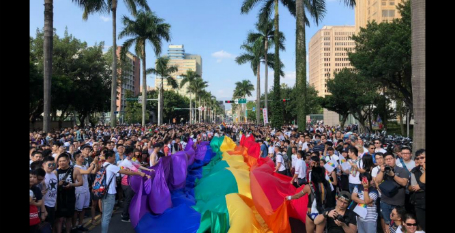It was a very disappointing day for Taiwan’s LGBT Community and indeed for LGBT equality and rights-related efforts more widely.
Not only did the public vote go against same-sex marriage equality but voters also voted down a law from 2014 which mandates the teaching within the national curriculum of ‘homosexual related’ issues.
However, on a positive note, voters did vote in support of legislating (without changing the Civil Code) to recognise same-sex marriage within three months. On a further positive note, Taiwan for the first time elected two openly Lesbian Local Council Members) and hopes are now that Taiwan will proceed to legislate with 3 months to create a formal same-sex partnership structure, even if this is not to be realised through a change to the Civil Code’s definition of marriage, which would have granted equality.
[ insert hyperlink on “public vote” to https://www.fridae.asia/gay-news/2018/11/25/14384.disappointing-defeat-for-lgbt-community-in-taiwan-referendum-on-same-sex-marriage ] [ insert hyperlink on “two openly Lesbian Local Council Members” to https://www.gaystarnews.com/article/taiwan-elects-first-openly-lesbian-local-council-members/#gs.JIVdX=g ]
While this is clearly not the result desired by the LGBT Community and its Allies - and for the many who had their hopes set on finally achieving this aspect of equality, the referendum result represents a tangible setback and dashing of such hopes, one encouraging aspect that has become apparent in other locations is that a Civil Partnership type structure can at least offer elements of equivalent rights and protections for the LGBT Community - and potentially pave the way for full same sex-marriage equality at a later date, once society’s understanding has matured and become more accepting and inclusive towards the LGBT Community within the shared society. This was the case in the UK and other European Countries where a Civil Partnership structure allowed full protections and equivalent rights for the Community, and then later transitioned to full same-sex marriage equality. Having equal rights and protecting partners is crucial for the LGBT Community, as many of us find ourselves with no formal legal or financial protections. This is a model that is currently being considered in Thailand and we hope that both Taiwan and Thailand will shortly have in place a structure that allows full rights and protections for LGBT couples, and which will hopefully provide incentive and be catalysts to other parts of the region.
Our thoughts are with you Taiwan!
Not only did the public vote go against same-sex marriage equality but voters also voted down a law from 2014 which mandates the teaching within the national curriculum of ‘homosexual related’ issues.
However, on a positive note, voters did vote in support of legislating (without changing the Civil Code) to recognise same-sex marriage within three months. On a further positive note, Taiwan for the first time elected two openly Lesbian Local Council Members) and hopes are now that Taiwan will proceed to legislate with 3 months to create a formal same-sex partnership structure, even if this is not to be realised through a change to the Civil Code’s definition of marriage, which would have granted equality.
While this is clearly not the result desired by the LGBT Community and its Allies - and for the many who had their hopes set on finally achieving this aspect of equality, the referendum result represents a tangible setback and dashing of such hopes, one encouraging aspect that has become apparent in other locations is that a Civil Partnership type structure can at least offer elements of equivalent rights and protections for the LGBT Community - and potentially pave the way for full same sex-marriage equality at a later date, once society’s understanding has matured and become more accepting and inclusive towards the LGBT Community within the shared society. This was the case in the UK and other European Countries where a Civil Partnership structure allowed full protections and equivalent rights for the Community, and then later transitioned to full same-sex marriage equality. Having equal rights and protecting partners is crucial for the LGBT Community, as many of us find ourselves with no formal legal or financial protections. This is a model that is currently being considered in Thailand and we hope that both Taiwan and Thailand will shortly have in place a structure that allows full rights and protections for LGBT couples, and which will hopefully provide incentive and be catalysts to other parts of the region.
Our thoughts are with you Taiwan!












 打印版本
打印版本




















读者回应
抢先发表第一个回应吧!
请先登入再使用此功能。